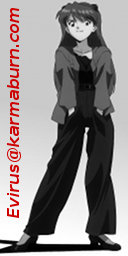|
|
Blog Archives:
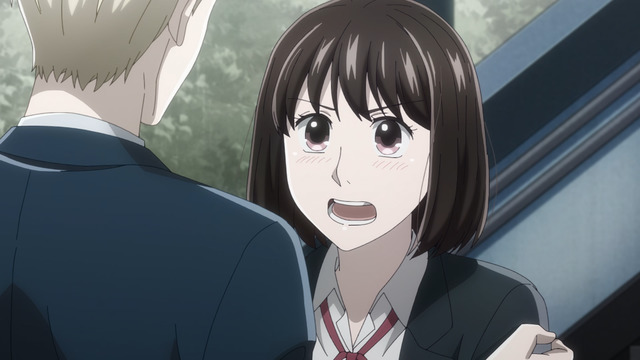
They're not flirting.
I started the Spring 2021 season with an entry covering both Koi to Yobu ni wa Kimochi Warui (It's Disgusting to Call This Love or KoiKimo) and Hige wo Soru. Soshite Joshikousei wo Hirou. (I Shaved. Then I Brought a High School Girl Home. or HigeHiro), so I guess I should have a post wrapping them up as well. I found KoiKimo to be a better series, perhaps because of its straightforward story. It also helps that KoiKimo leaves Ichika in control of her fate. It is ultimately Ichika's decision whether her relationship with Ryo will advance or not.
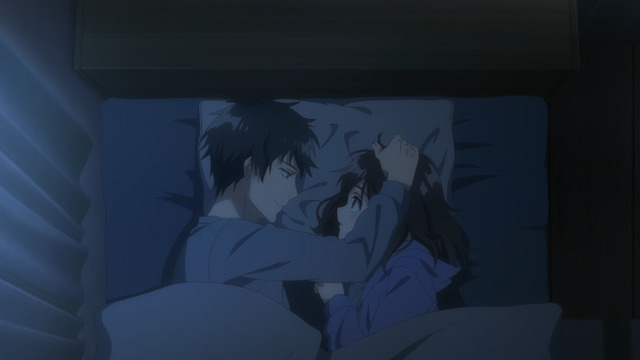
Platonic head pat.
Sayu does not have this luxury in HigeHiro. Maybe it's disingenuous to claim HigeHiro is about Yoshida "looking for something attractive to save" (my apologies to Liz Phair), but replace Yoshida's name here with "the audience's surrogate," and maybe it's not far off the mark. KoiKimo and HigeHiro both ended up where I expected, but Sayu had much less say over the path she took to get there.
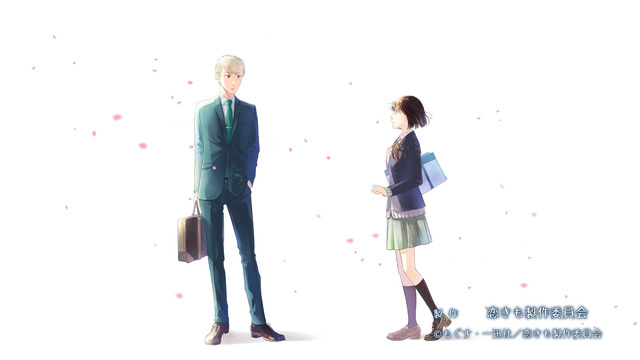
Making the end credits look more like the manga art was a nice touch.
In contrast, KoiKimo is an honest romance. There is no real mystery whether Ichika and Ryo will actually end up together or not, even though KoiKimo does introduce rival love interests for both leads. Moreover, the rivals are genuinely more sensible partners from every objective metric. However, the most obvioius impediment—the age gap between Ichika and Ryo—is never depicted as a meaningful obstacle. When it is finally viewed as a problem, its solution is entirely unsurprising.
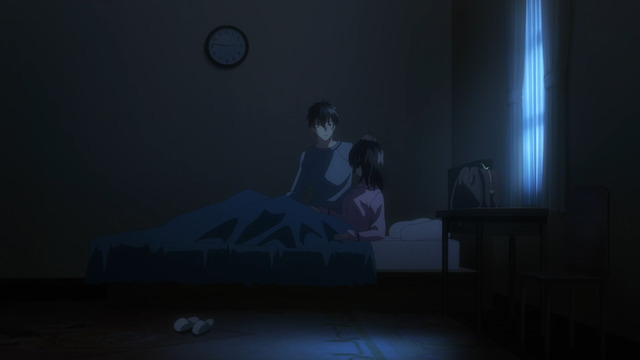
Platonic head pat.
The solutions to the challenges presented in HigeHiro are also fairly obvious, but the series insists on pantomiming a number of unconvincing feints. They're unconvincing because Sayu basically has no flaws, and Yoshida clearly feels something for her. He never has a reason to turn her away, and Sayu's rivals for Yoshida's attention are dubious love interests who quickly end up supporting Sayu anyway.
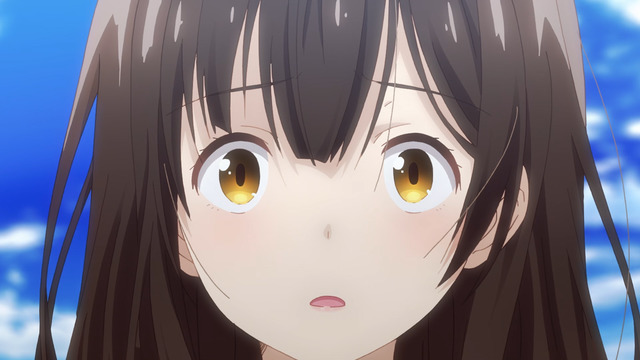
Relax, Sayu. Wonder Eggs are only 500 yen each.
In fact, Sayu's true adversaries are her lack of self-worth, her family's disinterest in her welfare, and the story's insistence at making Yoshida obtuse. Yoshida's behavior is baffling in HigeHiro, and not just because he denies being attracted to the sexually available high school girl living with him. Yoshida's behavior is baffling because he's willing to accept immediately on faith that Sayu would be better off returning to her home, without ever examining even the slightest bit the reasons why she ran away in the first place. It seems irresponsible to not at least contemplate the myriad awful situations that potentially compel teenagers to leave home and offer sex to strangers just to survive.
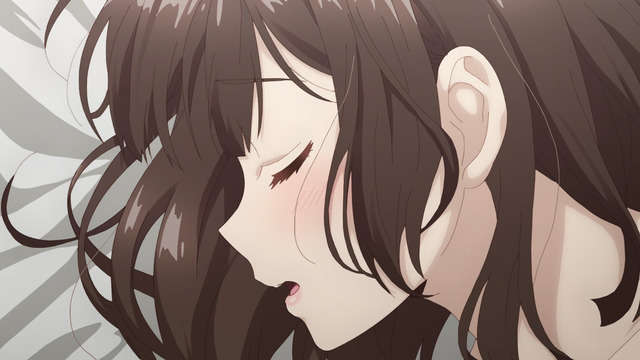
HigeHiro showed Sayu orgasming on screen.
Of course, the real reason Yoshida never asks is because the story can't let him or the audience know before the narrative is ready. It turns out the unpleasant situation Sayu fled wasn't that bad, but that's the case only because HigeHiro insists on rehabilitating its antagonists immedately after introducing them. This sort of cowardice is a significant weakness of HigeHiro, as it makes its conflicts fairly hollow. The challenges presented in KoiKimo are not intractable either, but at least they don't take on a fraudulent quality.
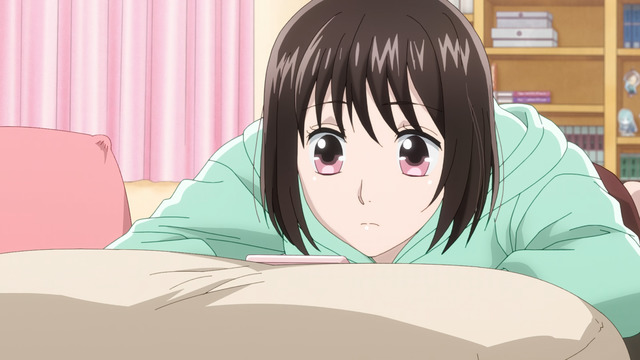
Ichika grew accustomed Ryo's nightly calls without realizing it.
KoiKimo succeeded by being forthright about its romance and committing to it unapologetically. In contrast, HigeHiro (like Yoshida himself) spends basically the entire series maintaining an unconvincing veneer of plausible deniability over whether or not Sayu is an actual love interest. At the risk of attracting accusations of being in favor of age-inappropriate pairings, I'm going to suggest HigeHiro does this to its detriment.
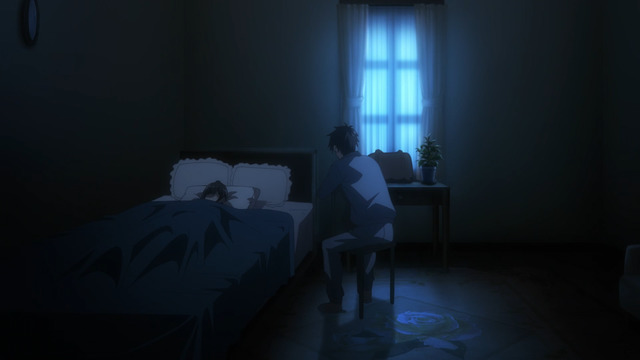
They had to put him in a chair watching her sleep
so people wouldn't insist they still fucked.
I suppose I can't speak for its source material, but the anime most certainly portrays Sayu as an eligible partner. Does HigeHiro provide Sayu with agency by having her test Yoshida's resolve each time she propositions him? Or does the series undermine Sayu's agency by presenting these moments solely so Yoshida can continue to rebuff her and showcase his unflagging integrity? I'm not answering this rhetorical, but I think we all know.
Posted in Hige wo Soru. Soshite Joshikousei wo Hirou., Koi to Yobu ni wa Kimochi Warui | Tags: 16-year-old love interests, Bad Things Happen to Good People, Bend Her Over a Kotatsu, Built for Sin, Christmas Cake, Compare and Contrast, Fan Service, Hanakana Distortion Field, Hanazawa Kana, Harem Comedy, Light Novels, Love Confessions, Love Triangle, Manga, May-December Romances, Plying Girls, Rape, Romance, Season Conclusion, Sex, Spoilers, Spring 2021, tsundere, Unrequited Love | Permanent Link
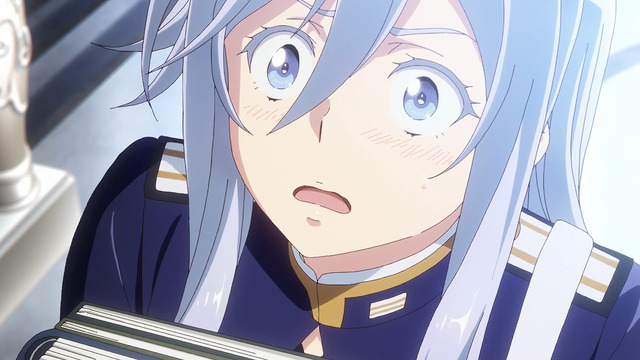
Does this mean Lena has figured out she can use the PARA-RAID for phone sex?
After 6 six episodes of 86 Eighty Six, I think I can understand why readers enjoy the original light novels. I haven't been following the reactions to the anime closely, but I believe most impressions to it are favorable as well. The story has had enough interesting developments and twists that I expect most viewers who ventured past the first episode continue to enjoy it. If the anime gets more than one cours, I could see how an eventual romance between the two leads might make up the core of the story. Moreover, it would probably be better if that is that is the case, because 86 Eighty Six as a war story is somewhat shite.
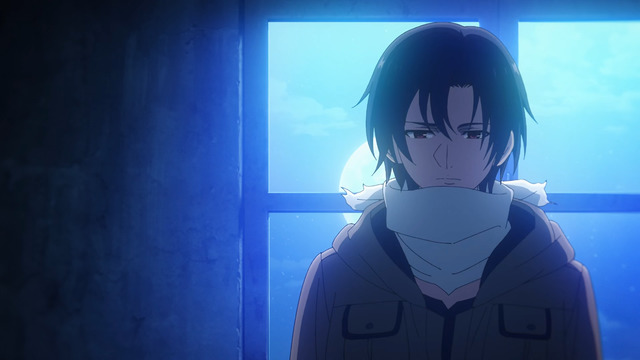
This is Mikasa Ackerman's son, isn't it.
The anime is still revealing elements about the war in 86 Eighty Six, but I get the feeling we're all better off not thinking about it too much. Aircraft exist, but only so tourists can get shot down. Artillery exists, but only in the form of weenie short-ranged mortars. The apparent objectives for the battles shown so far are also sort of questionable. On the plus side, their spider-mechs are pretty fresh. I get that it's unfair to criticize 86 Eighty Six for these sorts of things when I'm totally okay with the SSSS.DYNAZENON fights, but it is possible to make unrealistic battles compelling (see The Price of Smiles, for example), and these just aren't.
Posted in 86 Eighty Six | Tags: Bad Things Happen to Good People, Girls With Guns, Initial impressions, Light Novels, Season Introduction, Spoilers, Spring 2021, war, War Is All Hell | Permanent Link
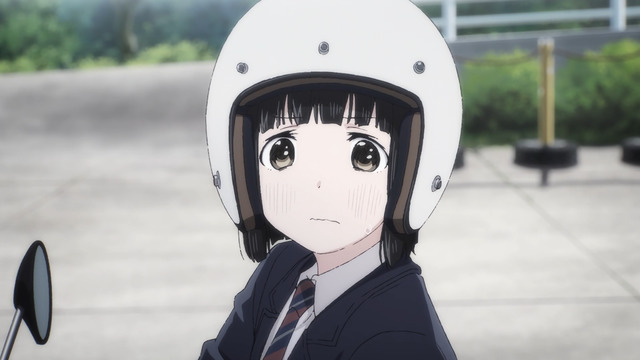
Relax, kid. You're gonna be all right.
Super Cub is not an isekai (at least not yet), but it does feature an extremely low-key girl discovering a new world. Koguma lives a life of solitude and makes obvious efforts to avoid drawing attention to her young self. However, she does score a used Honda Super Cub for about a hundred bucks, and it starts to change her life. Thematically, there are similarities to the Ah! My Goddess arc where Skuld learns how to ride a bicycle. It's a liberating moment for both of them, when Skuld finally experiences the joy Belldandy already knows, and when Koguma discovers her old boundaries are gone.
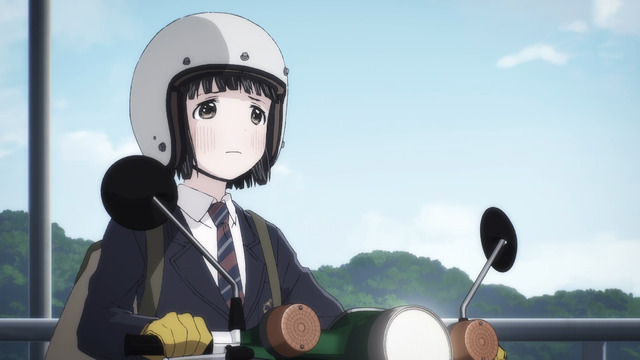
When you double-ride with anxiety, you never ride alone.
At the risk of spoiling both the first episode of Super Cub and The Wizard of Oz (1939), color similarly bursts onto the screen when Koguma departs her drab old world for her mysterious new future once she successfully kick-starts her Cub's engine for the first time. I wouldn't call the transition subtle, but I know not all viewers caught it during the moment. Through three episodes, Super Cub regularly uses these sort of visuals and audible cues to communicate Koguma's further discoveries. I don't know if the anime will continue to concentrate on this sort of internalized wonder, or if it will transition into a more conventional "girls who really enjoy a specific hobby" show, but I'm eager to go along for the ride—even if the conveyance in question has already killed thrice before.
Posted in Super Cub | Tags: Light Novels, Product Placement, Season Introduction, Spoilers, Spring 2021 | Permanent Link
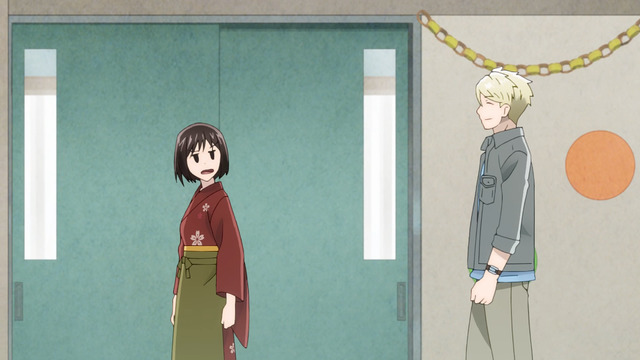
Stalker distancing.
News that the Spring 2021 anime season would feature TWO shows about adult men paired with high school girls created ripples across the Twitter, but even this mild outrage waned after viewers discovered neither show was as torrid as anticipated. Descriptions of Koi to Yobu ni wa Kimochi Warui (It's Disgusting to Call This Love, A.K.A. Koikimo) in particular concentrated on elements that ranged from misleading (characterizing its male lead as "a womanizer") to outright untruthful (e.g., calling him "sex-crazed...with a wandering eye for women"). At the risk of stereotyping too much, I suspect more attention should have been paid to the fact that the Koikimo manga is described as josei (i.e., for adult women) instead of seinen (i.e., for adult men who miss fucking teenage girls).
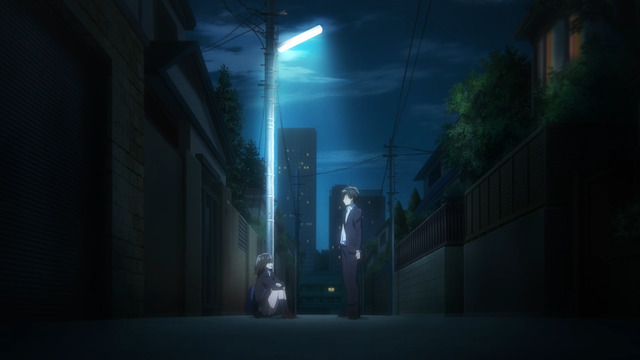
I was too bothered by Sayu's lack of luggage to make a Fate/stay night joke.
Curiously, Hige wo Soru. Soshite Joshikousei wo Hirou. (Higehiro: After Being Rejected, I Shaved and Took in a High School Runaway) seemed to attract less pre-season attention than Koikimo, but perhaps its original novels and manga adaption were already known well enough to deflect unwarranted speculation that it was going to be a smutty romp. This, despite its synopsis outright stating that its characters meet when the titular teenage girl, Sayu, offers sex in exchange for a place to stay. Instead, Higehiro is about a man, Yoshida, who insists he is not attracted to the JK crashing at his place. The series begins with Yoshida being rejected by his long-term crush (his boss at work, no less) who claims she is already seeing someone. He is so devastated that he seemingly does not even notice she was CLEARLY LYING.
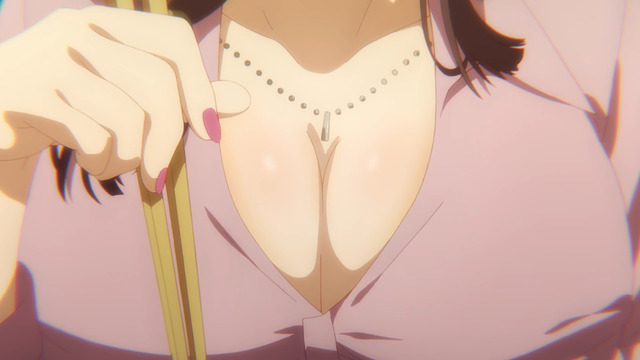
Dude, you're staring.
Higehiro also draws attention to Yoshida's insistence that he is not a "nice guy" for letting Sayu live with him without strings attached (unlike everyone else she has stayed with during her previous six months as a runaway), but rather that the other men she has known are despicable people. Yoshida also repeatedly insists he is not attracted to Sayu because he only likes women with large breasts, but then the show promptly undercuts him by immediately alerting (and repeatedly reminding) the viewer that Sayu's boobs are also comfortably big.
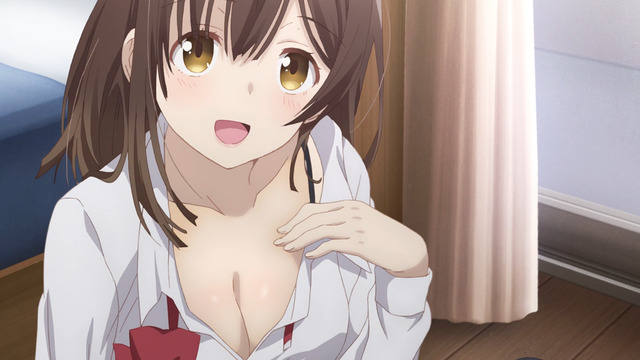
Higehiro even quantifies the comparison.
This is where I lose the ability to predict the path Higehiro will take. There is enough fan service and "male gaze" to the anime that we are obviously supposed to see Sayu as a legitimate love interest of Yoshida's, despite (or perhaps because of) his loud denials. But the show also retains the harem elements by keeping the CLEARLY LYING boss lady and deliberately slapdash co-worker near as potential romantic rivals. If I had to guess how this story ends, I would expect Yoshida's support to put Sayu on a path to success before re-uniting the two after a multi-year timeskip apart that has given Sayu time to become a self-sufficient adult with even bigger boobs than ever. Alternatively, we'll get a cop-out non-ending ending, potentially with all four of them living together for contrived reasons.
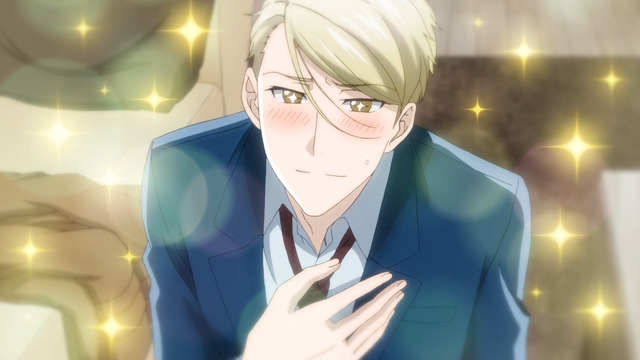
You can tell he's sincere because of the sparkles.
While Higehiro is about a man who denies being attracted to the teenage girl living with him, Koikimo is about a man openly and aggressively wooing a high school girl 10 years his junior. At this point, I think it is necessary to acknowledge the tropes that govern this story's boundaries. Ryo and Ichika meet by chance and a suspension bridge moment sparks his sudden obsession with Ichika, who is coincidentally classmates with Ryo's kid sister, Rio. Fortunately for Ryo, his sister not only approves of his infatuation with her friend, but even volunteers as his wingman to provide opportunities for him to get closer with Ichika.
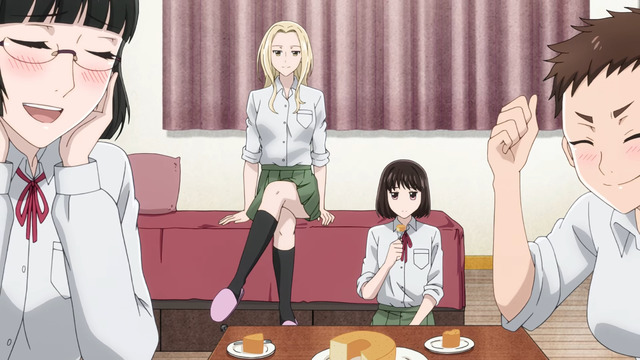
Rio's anime bed is made of concrete.
Moreover, Ichika's own mother approves of Ryo's courtship, despite Ichika's clear displeasure. It is probably worth pointing out that Ryo has apparently never had to pursue a love interest before. He is not a pick-up artist chasing after fresh prey. Instead, girls and women have thrown themselves at him his entire life (Ichika's and Rio's classmates all unanimously agree Ryo is exceptionally handsome), so this is an entirely new experience for him.
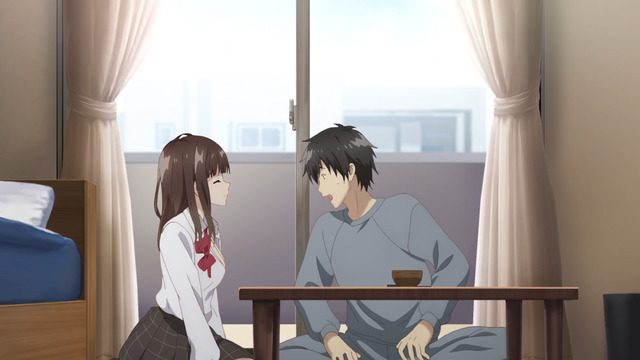
Dude, you're staring.
So what are Koikimo and Higehiro both missing? Lust. In the case of Koikimo, Ryo is clearly, genuinely smitten with Ichika, but he is arguably more drawn to her disinterest in him than he is to her physical appearance. Ichika is presented as being fairly unremarkable among her peers, and her own best friend describes her as "normal" (although at least one boy at her school has taken a liking to her). In the case of Higehiro, it takes three episodes of the show loudly signalling that Sayu is comely and sexually available before Yoshida finally admit he finds her attractive. However, his refusal to sleep with her is predicated on a critical, foundational cornerstone to the narrative's integrity, so I don't expect the story can too easily reverse this stance even if the audience comes to think he protests too much.
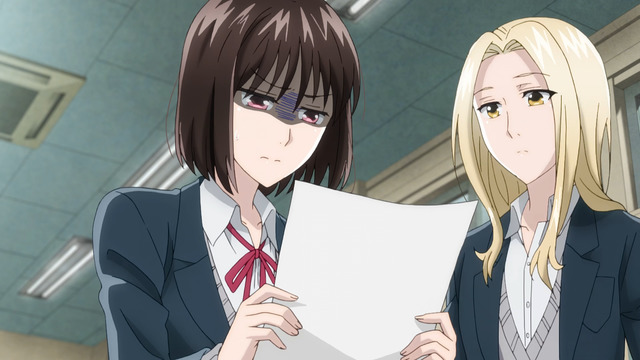
She is upset because she is pleased.
After four episodes of Koi to Yobu ni wa Kimochi Warui and three episodes of Hige wo Soru. Soshite Joshikousei wo Hirou., I enjoy Koikimo more than Higehiro. Neither series is especially realistic (although I could believe Higehiro, despite the melodrama, were it not for the CLEARLY LYING Christmas-cake boss lady and the co-worker who deliberately fucks up her work for Yoshida's attention), but I find Koikimo more amusing. I can't rule out the possibility that I'm simply more enamored of Ichika's seemingly endless barrage of disgusted faces than I am with Sayu's "pretty big for a high school girl" bosom, though.
Posted in Hige wo Soru. Soshite Joshikousei wo Hirou., Koi to Yobu ni wa Kimochi Warui | Tags: 16-year-old love interests, Bend Her Over a Kotatsu, Built for Sin, Christmas Cake, Compare and Contrast, Harem Comedy, Light Novels, Love Confessions, Love Triangle, Manga, May-December Romances, Plying Girls, Rape, Romance, Season Introduction, Sex, Spring 2021, tsundere, Twitter, Unrequited Love | Permanent Link
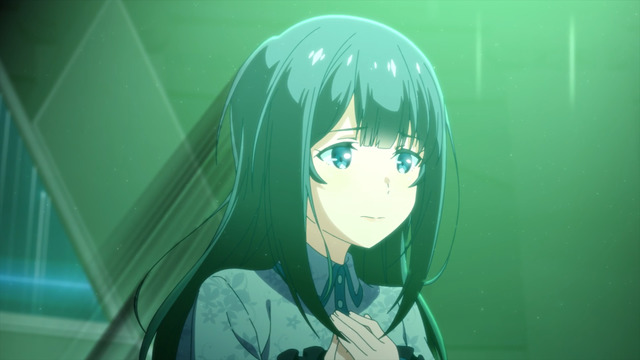
It's not easy being an idol.
IDOLY PRIDE turned out to be a much more satisfying anime than I was expecting. I already had some idea where the show was going, since it became increasingly clear what the first episode's prologue implied as the anime progressed. Nevertheless, it also still retained enough ambiguity to allow the show to develop dramatic tension as it approached its climax. Ultimately, this was still very much a story about Mana and Makino, and remembering this worked out well for the anime.
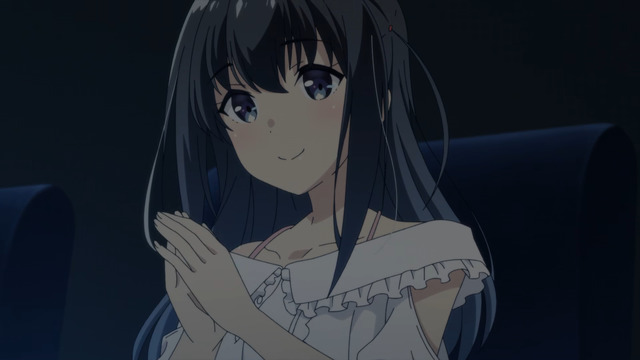
What is the sound of one ghost clapping?
However, there is more to IDOLY PRIDE than just the anime, and this is where my lack of familiarity with the franchise as a whole falters. Based on the release dates of the associated videos on the YouTube, IDOLY PRIDE has been in the works for over a year. Was it just delayed for reasons related to the COVID-19 pandemic, or was it originally planned as an extended mixed-media production? There are CDs to purchase, and a mobile game of some sort to play, but I don't know how critical the anime itself is to the whole.
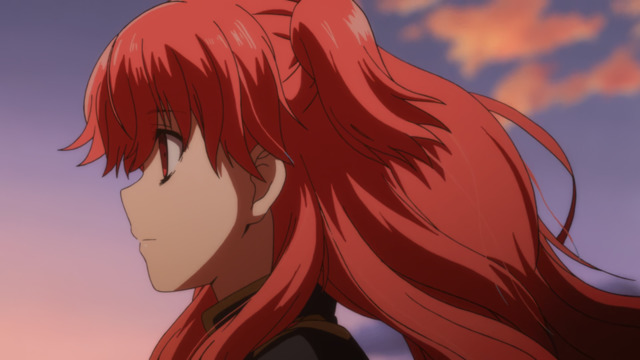
Goodbye, Chtholly's last bit of blue hair.
I didn't really need to mention SukaSuka here, since it's not as if Shuumatsu Nani Shitemasu ka? Isogashii desu ka? Sukutte Moratte Ii desu ka? and IDOLY PRIDE really have that much in common aside from dropping spoilers at the start of the first episode. The SukaSuka spoilers are much more overt, though, and consequently much more memorable. There is also a certain finality to the series, in that while there are still additional volumes to adapt, adding a sequel to SukaSuka would not necessarily be the same thing as "making more" SukaSuka. In the case of IDOLY PRIDE, there are certainly enough characters to provide new opportunities for expansion through sequels, but I'm hesitant to suggest there's any need at this stage.
Posted in BEST GIRL, IDOLY PRIDE, Shūmatsu Nani Shitemasu ka? Isogashii Desu ka? Sukutte Moratte Ii Desu ka? | Tags: Air Power, Ghost Girlfriends, Idols, Light Novels, Romance, Spoilers, Spring 2017, war, War Is All Hell, Winter 2021 | Permanent Link
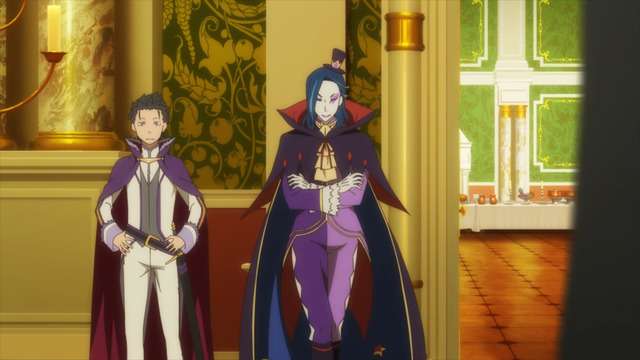
It's fine, they're cool now.
My enjoyment of the Re:Zero anime has been inconsistent. I initially lost interest in the series quite early and dropped the show more than once. I finally picked it up again after enjoying Isekai Quartet and its myriad gags about Ram being smug and/or abusive. After finally sticking with the first season, I did enjoy most of it. I also liked the first half of the second season, but the most recent cours, Re:Zero kara Hajimeru Isekai Seikatsu 2nd Season Part 2, did not hold my interest.
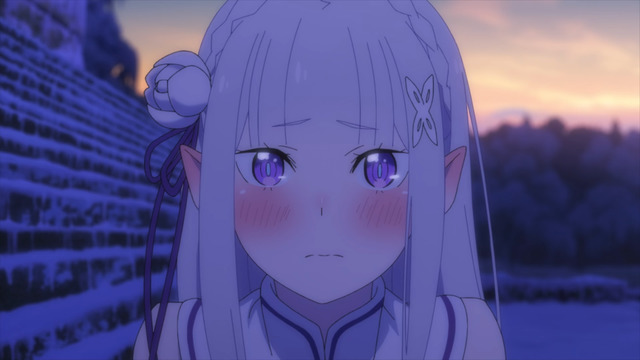
I'm going to claim Puck is a shitty parent.
If I had to say why, I guess it's because I found Garfiel rather grating. He has legitimate reasons for being that way, but they didn't make him less tiresome to watch. This cours also focused heavily on Emilia, and deservedly so. Unfortunately, I've never had any interest in Emilia, so I wasn't exactly invested in her arc. If you are a big fan of Emilia, then I would expect you to regard this cours as being one of the strongest ones of the anime thus far. However, it is difficult for me to weigh this objectively, so possibly it still dragged even for Emilia superstans. Presuming there is a third season, I am going to continue watching it, but I do hope it gets better. Maybe have some more Rem? I could go for more Rem now.
Posted in Re:Zero kara Hajimeru Isekai Seikatsu, Re:Zero kara Hajimeru Isekai Seikatsu 2, Re:Zero kara Hajimeru Isekai Seikatsu 2nd Season Part 2 | Tags: Bad Things Happen to Good People, DARK MAMIKO, Light Novels, Love Confessions, Mamikore, Sakamoto Maaya, Sequels, Summer 2020, Winter 2021 | Permanent Link
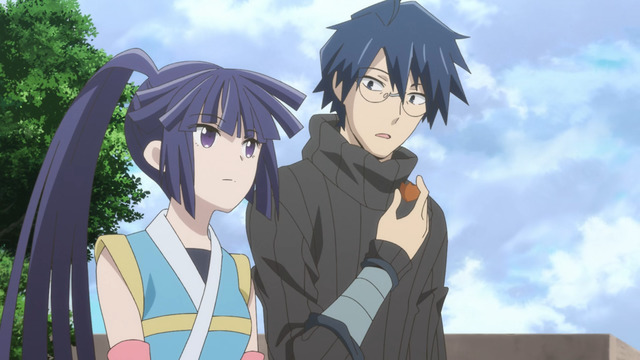
It's not a date.
The first season of Log Horizon provided an entertaining perspective on what it might be like to be trapped in a video game. Even now, it holds up well when compared against the relentless tide of trapped-in-a-video-game isekai bullshit anime that seems—itself—nearly inescapable now. The second season of Log Horizon was all right, but it is common to find fans who like it a lot less. The currently airing third season, Log Horizon: Entaku Houkai (Log Horizon: Destruction of the Round Table) has mostly been about politics during the past eight episodes. It doesn't exactly get the series off to a rousing fresh start after its six-year absence.
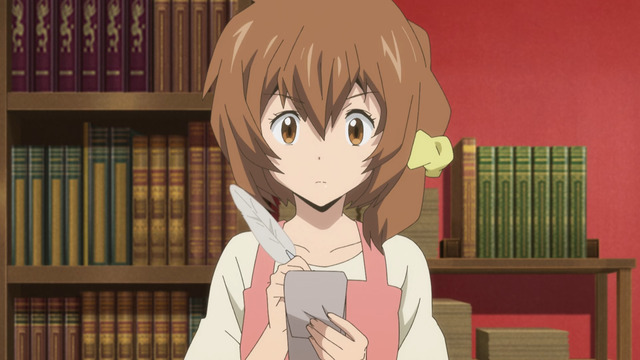
Minori is still writing shit down—still being competent and helpful.
The preview for this week's episode heralds the return of love-triangle high jinks involving Minori (who was very recently merely a shrimpy kid), Akatsuki (who was and still is a shrimpy grownup, and Shiroe (the purported adult in the room). Naturally, I don't expect this to actually go anywhere. It has (at least been) pretty obvious that Akatsuki is the only real love interest. Even then, there's no indication there will be any meaningful progress anytime soon. Ergo, propping up Minori (who I think is still only around 14) as a romantic rival is probably going to be just more of the same low-stakes love-triangle nonsense from previous episodes.
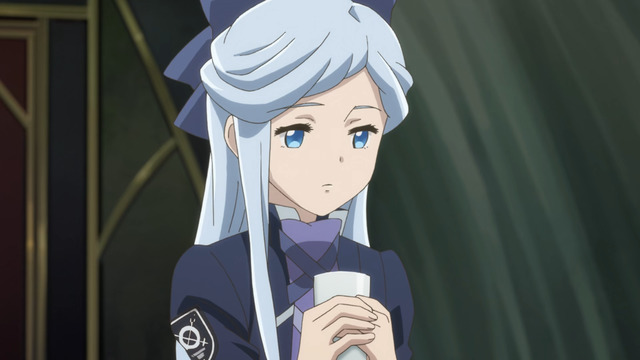
They're literally going to put Lenessia on a SHIP so she can go get Krusty and
bring him back instead of just quietly thinking about him all the time.
Curiously, it seems the Krusty x Lenessia pairing might actually have some life. Originally, I mostly regarded the interaction between these two as that of a young man who (somewhat inadvertently) prods a recalcitrant princess into seizing the reins of destiny when originally he just wanted to amuse himself by teasing a teenage girl for a while. However, season three is making me question whether my assumptions about Krusty—or, more specifically, the player behind Krusty's character—are wrong. It's at least not clear to me anymore how old he is or how long ago the brief flashbacks we've seen actually occurred. Suddenly, a Krusty x Lenessia pairing seems much more plausible than Shiroe x Akatsuki, and certainly more so than Shiroe x Minori, regardless of what this week's episode may bring.
Posted in Log Horizon | Tags: 16-year-old love interests, Light Novels, Romance, Season Introduction, Sequels, Unrequited Love, Winter 2021 | Permanent Link
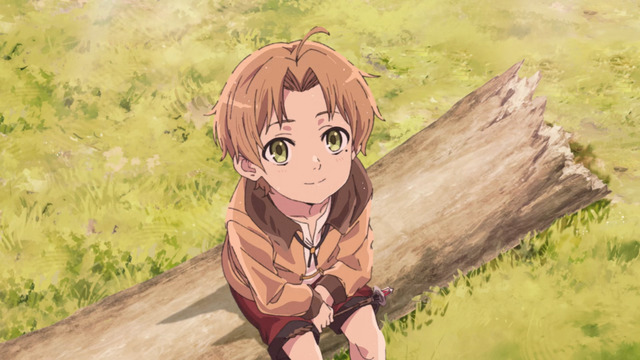
Would he still have ended up a shithead anyway if he didn't have incredible magic powers?
I was first introduced to Mushoku Tensei: Isekai Ittara Honki Dasu (Mushoku Tensei: Jobless Reincarnation or Jobless Reincarnation: I Will Seriously Try If I Go To Another World) years ago when it was only a web novel. Specifically, every single thing I heard about it made it sound terrible, even from readers who enjoyed it. In particular, the protagonist (named Rudeus in his new life) sounded about as despicable as you can make a character, at least according to secondhand sources.
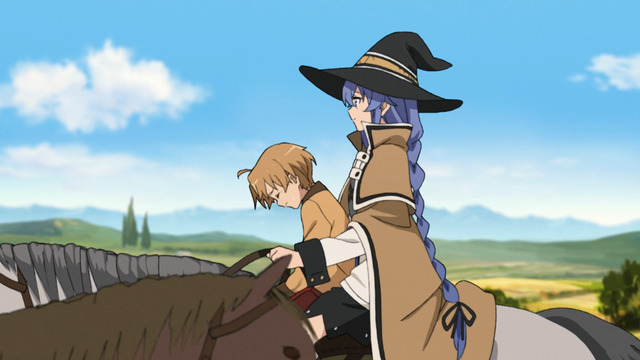
Roxy thinks Rudy only has crippling equine anxiety.
The second episode of the anime adaptation focuses a fair amount on the trauma that led to Rudy becoming a hikkikomori in his previous life. Even as a five-year-old boy in his new life, severe anxiety prevents him from leaving his home or making eye contact with villagers in the countryside. He does seem to get over it, thanks to the assistance of his live-in magic tutor who has befriended the neighbors during the course of her stay. I suppose this does inspire some degree of sympathy, since the anime depicts the bullying he suffered from his point of view and without any context. Still, it's not clear what transpired between his school days and adulthood. We learn he gets kicked out after staying home to masturbate instead of attending his parents' funeral, but it's less clear how he got there, and it's unknown what sort of course corrections—if any—he attempted during his life before reaching that point. The bullying is not enough for me to just give him a pass. In any case, the anime hasn't dwelled too much on his past (at least not yet), probably to its benefit.
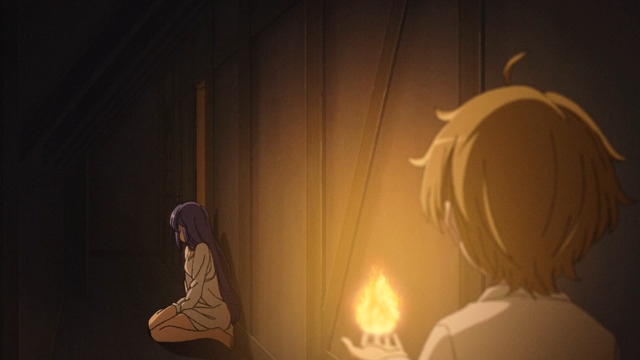
I sort of think Roxy would have noticed this.
The anime does continue to portray him as a perverted child, but there's not any comedic value in it. I presume these scenes are there to help establish a baseline that includes his pre-reincarnation persona and will thereby underscore progress that he makes later in this two-cours series. I'm mostly ambivalent about Rudeus at this point, so that's relatively positive considering I was expecting to loathe him. The anime itself still looks really nice, so I imagine fans of the books must be pleased with how it's turning out. I don't know that I'm going to stick around for two cours of this, but the show seems all right so far. I was expecting more questionable creative choices in the writing, but it seems those impressions may have been web-novel baggage that Mushoku Tensei is not dragging with it into the anime, at least not so far.
Posted in Mushoku Tensei: Isekai Ittara Honki Dasu | Tags: Douche Bags, Fat Anime Characters, First Girl He Sees Clause, Initial impressions, Light Novels, Season Introduction, Sex, Winter 2021 | Permanent Link
|
|










